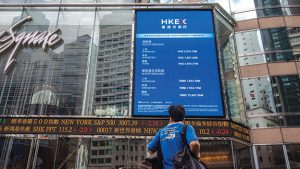Bloomberg
The mood for risk is seeping into every corner of Chinese markets, with policy moves to ease Covid-19 curbs and revitalise the economy fuelling
the biggest selloff in years in high-grade local corporate debt.
Yields on most AAA rated domestic corporate bonds jumped at least 10 basis points on Tuesday, according to traders. They hit a 13-month high of 3.16% for three-year notes of the
same rating, after logging the biggest increase since 2017
last month, according to the Bloomberg-compiled data.
The selloff offers the latest evidence of a momentous shift in investor sentiment toward Chinese assets, after optimism about faster economic reopening led to a rally in the country’s stocks and currency in the past month. It has also upended a domestic credit market that has shown remarkable calm and avoided the massive defaults this year, thanks to Beijing’s monetary easing.
“The selloff is mainly due to the easing Covid policy outlook, as investors are seeking higher returns and moving to riskier assets such as equities,†said Ting Meng, a senior credit
analyst at ANZ Bank China Co.
The exit from the local high-grade corporate debt has started last month when a selloff in the sovereign bonds drove retail investors to redeem mutual funds and wealth-management products that also contain such notes.
Outflows are continuing to impact the onshore credit market, China Merchants Securities Co. analysts including Yin Ruizhe wrote in a note. They added that the public funds are looking to shift to assets with better liquidity.
Stress in the local corporate debt market has remained low this year despite the tumult in offshore bonds, where a severe cash crunch among property developers has unleashed a record wave of defaults. In
addition to the much lower borrowing costs onshore, cash-strapped builders also have often managed to extend debt maturities to escape official delinquencies.
The latest turmoil has already had a notable impact on domestic bond financing. Firms pulled plans to sell 59.4 billion yuan ($8.5 billion) of local notes in November, nearly five times the year-earlier figure and the highest level since January 2021, according to Bloomberg-compiled data.
Chinese stocks have rallied recently, fuelled by rising optimism that China is softening its pursuit of Zero Covid. In Hong Kong, the Hang Seng China Enterprises Index surged 29% in November, capping its best month since 2003, while the benchmark Hang Seng Index posted its biggest monthly gain since 1998.
The rally was mainly driven by the gains in airlines, casinos, restaurant operators and other stocks expected to benefit from a reopening of the world’s second-largest economy. Investors are increasingly seen shifting their bets to longer-term plays such as consumer and health-care equities, from travel and catering firms whose shares have jumped sharply.
 The Gulf Time Newspaper One of the finest business newspapers in the UAE brought to you by our professional writers and editors.
The Gulf Time Newspaper One of the finest business newspapers in the UAE brought to you by our professional writers and editors.
